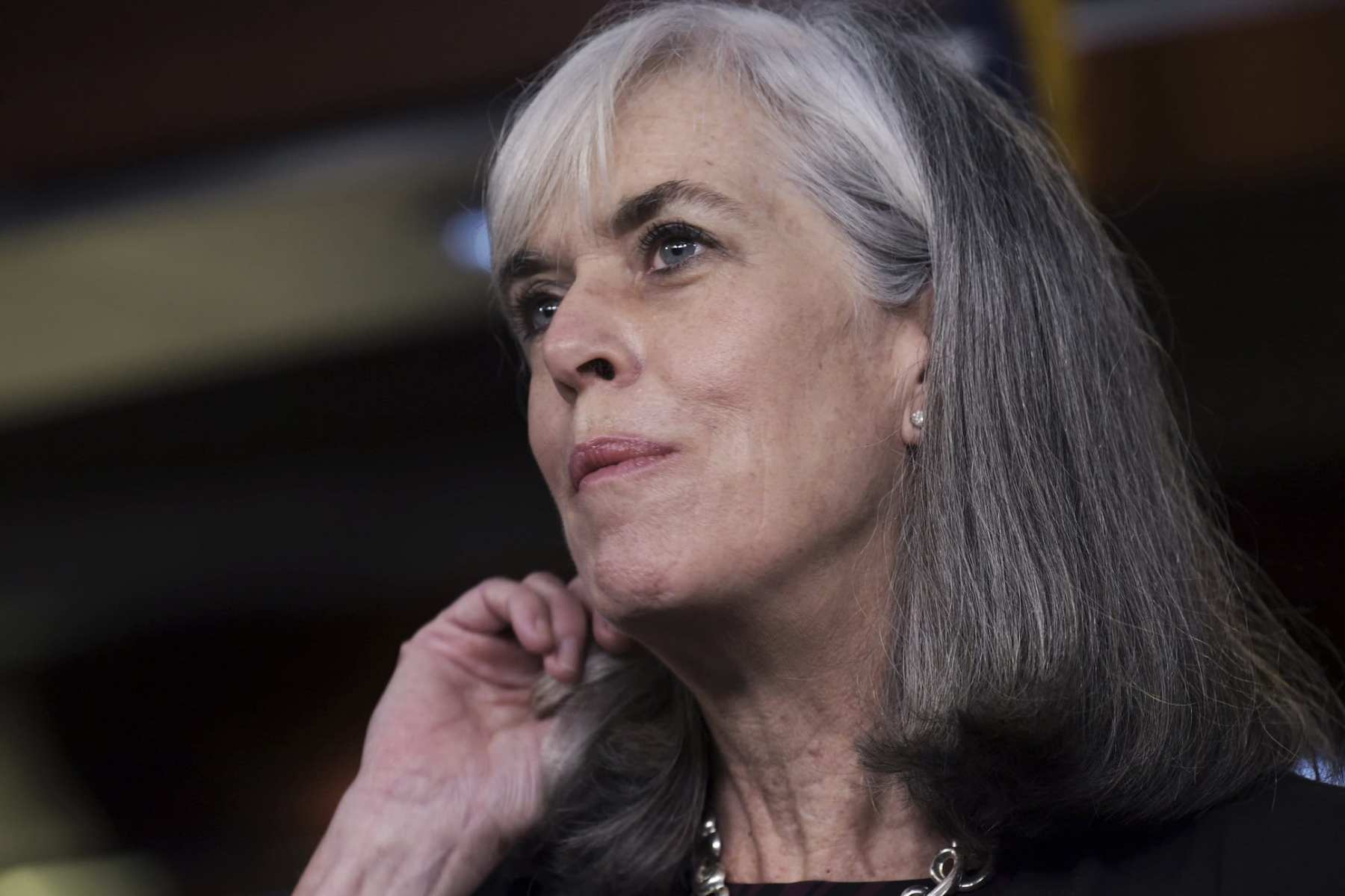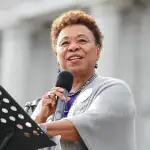When the 117th Congress begins in January, Massachusetts Democratic Rep. Katherine Clark will become the second-highest ranking woman in Congress after Speaker Nancy Pelosi and the second woman ever to be elected to one of the top four positions in leadership in the House of Representatives.
Clark, who was elected last week by her Democratic colleagues as the incoming assistant speaker, talked to The 19th’s Editor-at-Large Errin Haines on Tuesday about her new role, the importance of representation in political leadership and how women will help shape the agenda as the new administration takes office.
This interview has been edited for length and clarity.
Errin Haines: Let’s start by talking about your journey to assistant speaker and why it matters that you will be the first woman to hold this position and become the second-highest ranking woman in Congress?
Katherine Clark: Well, I think that representation matters, and for too long, women have been left out and left behind. When we are at the leadership table, the priorities change. Right now, when women in this country are facing such devastation from racial and economic injustice and the effects of the pandemic, it is the time to make sure that their voices are heard and their priorities are in the agenda that we are setting.
What do you see yourself bringing to this role, especially based on your lived experience?
The reason that I ran for this seat was really, in large part, based on my experience in the 2018 cycle, when I was co-chair of recruitment … and worked all over the country recruiting candidates, but with an emphasis on women and candidates of color. Back in that time, when we could actually travel the people’s districts, I really got to know what districts look like that are very different from mine in suburban Massachusetts. I found [that the] values of wanting a fair shot, of wanting to be able to take care of your family, were the same anywhere I went in the country.
It’s a focus on those issues that keep families up at night. Are they going to be able to have health care for their family? Will there be a next job? Can they ever afford to retire? These are the issues that we are going to focus on in the 117th Congress, along with crushing this virus and making sure that we are investing in treatment and testing and vaccine distribution. These issues are the reason that I am excited to get to work on in the 117th Congress, to help set that agenda and keep the focus on the American family.
You’re someone who has been focused on issues of child care for much of your time in Congress, an issue that has been brought into stark relief in this pandemic. Can you talk about how you plan to work with Speaker Nancy Pelosi to help shape what the next Congress’ governing priorities might look like, particularly with respect to the intersection of gender and policy?
A true priority, and longtime issue for me, is child care. And before this pandemic, like so many other issues, we knew there was a problem. We knew there were inequities, we knew that the predominantly woman’s workforce and women of color, were paid wages that did not reflect how essential their work was.
I remember being at a town hall in my district last year, and having child care providers who were working more than full-time and still were not able to provide for their families. And we also know that child care has been very difficult for families to access because of the high cost to consumers. So addressing this, and understanding that we are going to never have an economic recovery — and certainly one that includes and values women and their part and role in our workforce — if we do not invest in child care, is exactly the type of priority that shifts the paradigm from looking at child care as an accessory and a private decision between parents and a provider to recognizing it as a public good.
We see women being driven out of the workforce — because of schools that are closed and lack of child care — in rates far higher than their male counterparts. We’re seeing our inattention and underinvestment in child care play out in a very dangerous way for women and for our hopes of a robust, inclusive economy in the future.
You talked about representation mattering and the importance of women’s leadership. Speaker Pelosi has said that with her reelection as speaker that this is going to be her last term in that role. Can you talk about what her pioneering leadership as speaker has meant to you?
It has been tremendous. She has changed the course of history, and she has laid down a path for women to follow her. I have appreciated her mentorship, her leadership and that she really does reach back and pull women up with her. And to see a woman, especially in the last session of Congress, being the person who could stand up to [President] Donald Trump, and his racism and misogyny and his chaos, and hold up a different vision for what not only we can do in the House, but who we can be as a country going forward.
I think it is hard to overestimate the impact that Nancy Pelosi has had. And part of my work is to make sure that it soon becomes commonplace to see women in leadership in Congress, in the C-suites around this country. I hope to emulate her style and make sure that as I enter this new leadership position, that I am continuing my work to hold the door open for women and women of color who will follow.
What would you say is one of the biggest lessons that you learned from her about governing?
She knows exactly where her values are, and where they’re centered. And she keeps that as her North Star. And for her, it’s about the children. And that is something that resonates deeply with me, because my work before I came to Congress and in Congress is centered on women and children. And she always says you got to be able to take a punch and throw a punch for the children. She shows that while standing up for kids — making sure that children who are poor, that children who need health care coverage have a voice at the table — that we make sure that every child has the right to a great public education no matter what their zip code is, or how much money their mom has in the bank. Those are the children that she brings with her into every negotiating room.
That is inspiring to me, that we can keep our eyes so clearly on those who don’t have a voice, don’t have a vote, but are going to be determinant of the future of our country, and where we are even globally as far as addressing climate change and clean air and clean water. And so to look at that style of leadership — that is tough as nails, but always with an eye on the impact on women and children — is one that resonates and inspires me in my work.
Was that something that encouraged you to run for leadership? You talked about the benefit of mentorship and also keeping that door open for even more women to walk through. Is that something that you are doing and are planning to do as assistant speaker, especially in terms of that representation that you were talking about, both around gender and racial diversity?
That’s right. And this is the work that I did in recruiting, and then as vice chair of our caucus, making sure that we don’t just use the incredible and historic diversity of the House Democratic Caucus as a talking point, but that we’re actually weaving that diversity into our agenda. And we are raising up the voices of our members, whether they are [California Rep.] Maxine Waters, a powerful chair of financial services, or [Illinois Rep.] Lauren Underwood, an incredible young leader, but who was in her first term in Congress. We have to make sure that we are hearing from diverse corners of our caucus, and really listening and collaborating so that we get the benefit of the variety of life experiences and perspectives that make our diversity a strength. And that is work that I’m very much looking forward to continuing as we have, even with this new class coming in to our caucus further expanded the number of women and also the diversity of the members of the Democratic caucus.
I wanted to ask you about this incoming class. There is a lot of attention on the diversity of the class, but really the diversity of perspectives and viewpoints, and maybe even priorities for those who are coming into this 117th Congress. Talk to me about your role as assistant speaker in helping to do what President-elect Biden and Vice President-elect Kamala Harris are also tasked with, which is uniting the party and bridging divides, starting within the Democratic Party. How do you do that?
Well, the exciting part about the new class, about our caucus, is that we do reflect the beautiful mosaic of the American people. And we have to not be of one mind or in lockstep. But we have to value the strength that different perspectives bring, and their power to inform our legislation to really meet the needs of the American people in this historic time of challenge in our country.
In our caucus, what we’re really showing is that we value and respect the American people, and that we see them. Whether they are running a small farm in rural America, or a teacher in a large city, whether they’re in Kansas or Florida or New York, it is about acknowledging that part of the legislative process is coming together, building consensus. And as long as our focus remains on meeting the challenges that the American people are facing — this pandemic, racial justice, climate change and the existential threat that it is making those investments in our infrastructure and creating good jobs — we’re going to be able to show that we can use this incredible diversity and respect for each other’s opinions and perspectives to move the ball forward and to govern and deliver.
Can you talk specifically about maybe even your relationships with some of the more progressive members, progressive women who are in the conversation around how the agenda is going to look?
One of my good friends for many years, before either one of us came to Congress, is [Massachusetts Rep.] Ayanna Pressley. And we continue to talk to each other as friends, but also as colleagues. I’m proud to be a progressive voice in Congress and to be a progressive voice in leadership. We can keep pushing on those issues that we have seen this pandemic bring into stark relief. We know that there have been health care disparities, and Ayanna is one of those people that talks about getting proximate to the people who are suffering.
What we’ve seen is a Republican Party that doesn’t even want to engage around collecting data on the disparate impact of this virus on communities of color, so we have to pull these pieces because we share so much in a vision and focus of meeting this moment. It is important that we’re hearing from Ayanna and also from [Rep.] Sharice Davis, in Kansas, who brings a different perspective, but equally important, as one of the first Native American women to serve in Congress and also from a place that trends Republican. This is where we derive our strength, and our connection to the American people. And as a progressive, I see part of my role in leadership [is] to find those areas where we agree, and to be both bold, and act with urgency, and also bring along and explain and show that we can govern in parts of the country where we have tremendously talented members, but maybe they’re met with more skepticism over Democrats’ ability to relate to them. But we can do this. We need all parts, from the progressives to the Blue Dogs, to make a majority robust and to work and to expand. There’s too much at stake for us not to do this work together.
You mentioned Republicans. Now that we are heading into a new administration, a new Congress, what is your hope for working with the Senate to get some of these governing priorities accomplished that you mentioned? Do you feel like that there may be more of an opportunity for maybe the return of bipartisanship?
Well, I think we have a new powerful ally in Joe Biden and Kamala Harris, and that will change the dynamic, but ultimately, you know, [Senate Majority Leader] Mitch McConnell is a problem. McConnell has decided not to see the American people and to walk away from them during this pandemic, and I don’t know how we make him care again.
People are so hurting, they need relief. We are looking at deadlines at the end of the month, end of the year at the end of December, where unemployment will expire, eviction moratoriums will expire. Many of the pieces that we put in place in the CARES Act are going to go away if we do not take action. And we have been at the negotiating table, we passed the HEROES act in May, we went back in July and saved the post office, infused $50 billion into child care to stabilize the industry. We came back again in October and passed another relief package, we tried to pass a package that would help the airline industry survive and save those jobs. But we’ve been met with a “no, thank you,” and callous indifference.
So I can’t predict when Mitch McConnell is going to decide that his job is to work for the American people in this time of crisis, and not to stroke the ego of a president who just lost an election. But with the Biden-Harris administration, I am hopeful that we are going to be able to demonstrate that the solutions are there. The will is there. We, as Democrats, are never going to back down from fighting for what people need, so they can survive in order to be able to rebuild. Whether Mitch McConnell decides to join us in this is going to something that he is going to have to determine.
As you prepare to take on this new mantle of leadership, what excites you most about being a first, particularly as we near the end of the centennial year of suffrage?
That’s a great point. I think I am excited to get to work on the issues that women care about — and that’s just about everything. Whether it’s how they can care for their families, get paid equally, reduce gun violence in this country, make sure we’re protecting the right to vote, put in paid sick leave policies, support child care — all of the things that we’ve been fighting for — we have an opportunity to renew this pact, to shift the paradigm and show that we understand that women are not only 51 percent of the population, but that we are an economic powerhouse. And that we will not have a recovery unless we are serious about putting the pieces in place to make sure that we have not just the ideals in this country, but that equality and justice for all, including all women, are realities, and that we work together to put those blocks in place. I am excited about what the future will hold and how we can restore the American dream, not just for some, but for everyone.







